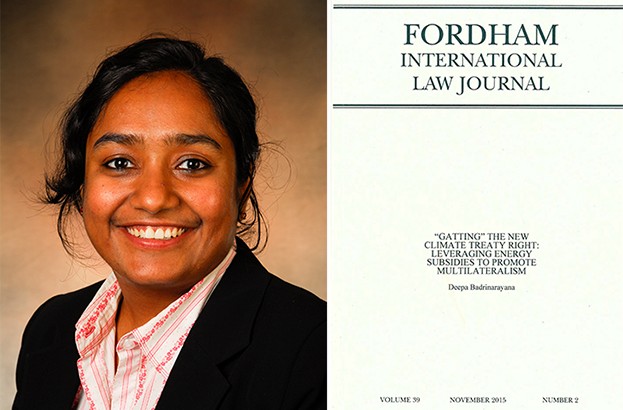
Fowler Law Professor Deepa Badrinarayana publishes “‘Gatting’ the New Climate Treaty Right: Leveraging Energy Subsidies to Promote Multilateralism”
February 10, 2016
Chapman University Dale E. Fowler School of Law Professor Deepa Badrinarayana’s article “
‘
Gatting’ the New Climate Treaty Right: Leveraging Energy Subsidies to Promote Multilateralism
” was recently published in Volume 39 or the
Fordham International Law Journal
.
From the abstract:
In a previous paper, Trading Up Kyoto: A Proposal for Amending the Protocol, I argued that not only do international trade rules, specifically the operation of the World Trade Organization (“WTO”) agreements, hinder international climate change treaty negotiations, but also that applying exceptions to circumvent trade rules is doctrinally difficult and normatively unsettling, primarily because of WTO jurisprudence, the colorable intent of nations that are violating WTO rules in the guise of mitigating climate change, and the challenges to creating environmental exceptions to trade rules to facilitate emissions reduction. To illustrate this point, I focused on ongoing trade disputes involving a few renewable energy subsidies through which some nations are apparently seeking to reduce their emissions. I then argued that an effective climate change treaty should counteract the impact of trade and trade rules. In this Article, I argue that nations should negotiate a plan to phase out harmful subsidies, particularly fossil fuel subsidies. The idea of eliminating subsidies is not new. It has been considered an important solution to reduce greenhouse gas emissions, and one that can complement WTO rules. This Article adds another dimension to this solution, i.e. leveraging subsidies within the new climate change treaty to encourage multilateralism. Multilateralism is essential to address the leakage and competition problems arising from the non- participation of all major greenhouse gas emitters. Effective unilateral measures to counter leakage violate WTO rules. I argue that nations can counteract this problem by incorporating into the new climate change treaty a mechanism to phase out harmful subsidies in exchange for a right to provide beneficial subsidies as one policy tool that would promote climate change mitigation efforts significantly. This proposal would complement, and not replace, existing provisions; would comply with WTO rules; would mimic other international environmental treaties, notably CITES, the Basel Convention, and the Montreal Protocol, which have addressed tensions between trade and an environmental problem by incorporating trade measures within the treaty.
Professor Badrinarayana
came to Fowler School of Law from Pace Law School, where she completed her Doctorate in Juridicial Studies in Environmental Law. Professor Badrinarayana researched for Professor Frank P. Grad at Columbia Law School on environmental and public health laws. Between 2005 and 2006, she was a Visiting Scholar at the Center for Global Legal Studies, Columbia Law School. Professor Badrinarayana is also a consultant to the United Nations Global Compact, on issues of corporate voluntarism and regulations. Before coming to the United States, Professor Badrinarayana was a Research Officer for a Government of India-World Bank Environmental Capacity-Building Project, at the National Law School of India University. In addition to research and advocacy, she also trained government officials and legal professionals in environmental law. Professor Badrinarayana was part of a team that advised the Government of India on its new legislation to manage biomedical waste. Professor Badrinarayana holds an LL.M. in Environmental Law from Pace Law School and a B.A.LL.B. (Hons) from the National Law School of India University. She is also a Member of the World Conservation Union, Committee on Environmental Law and serves as Chair of the Association of American Law Schools (AALS) Section on Law and South Asian Studies and as an Executive Committee member of the AALS Section on Environmental Law. Other recent articles include “
A Response to the IPCC Fifth Assessment Report: Security Regained (Security Lost? The Climate Change Conundrum)
,” published in 2015 in the
Environmental Law Reporter News & Analysis
, and “
Trading up Kyoto: A Proposal to Amend the Protocol
,” published in 2014 in the
Boston College Environmental Affairs Law Review
.

